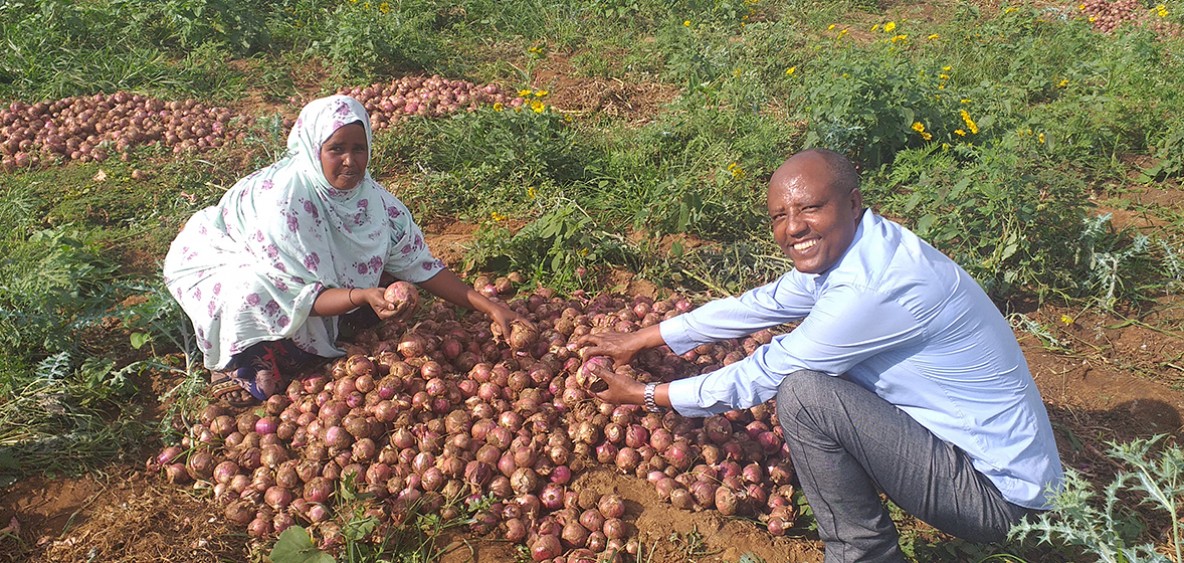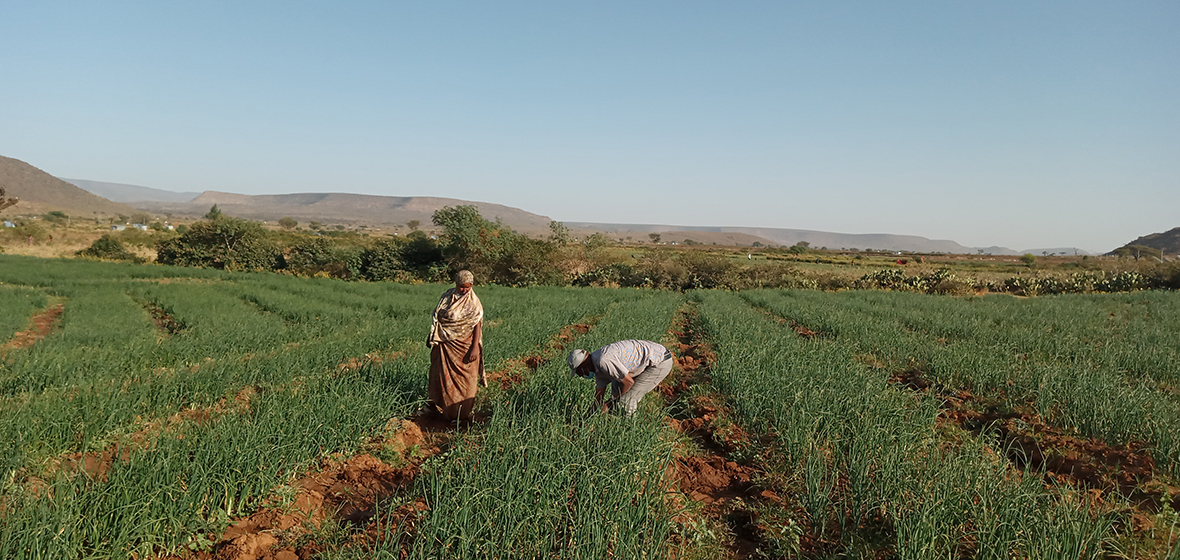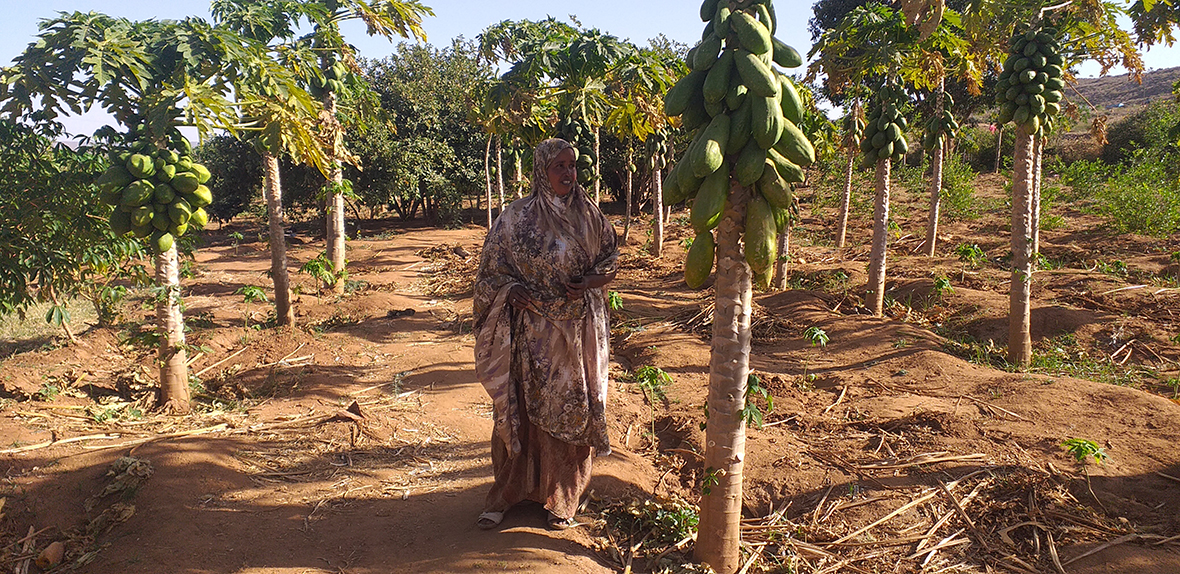
The near-constant threat of severe drought has made Ethiopia’s one of the harshest climates in the world for farming. With the support of the Resilient Food Systems programme and the Government of Ethiopia, one woman has defied the odds. Read more about how Ferdahusa turned her small-scale farm into a profitable business.
With ten major droughts since the 1980s and the recent desert locust plague, food security in Ethiopia is under constant threat. 85% of Ethiopians live in rural areas and are highly dependent on subsistence farming. These adversities make farming nearly impossible and many of the country’s citizens in rural areas often forego food and water for days at a time.
The hardships Ethiopians face are accompanied by population growth, which has increased the pressure on scarce natural resources like water and biomass fuels. All of this is against the backdrop of the ever-present threat of climate change. The country is getting warmer and drier with reports claiming the annual temperature has risen by .37 degrees Celsius per decade for the past 40 years.
Farming takes place on land poor of soil nutrients and degraded by vegetation loss and rampant erosion. All these factors have exacerbated widespread famine, malnutrition and disease outbreaks.
As primary caregivers and providers of food and fuel, women are disproportionally more vulnerable to climate change. They are also more likely to suffer displacement as a result of droughts.
Empowering women and promoting gender equality are cross-cutting objectives at the heart of the Resilient Food Systems programme. Focusing on women smallholder farmers is especially important in a country such as Ethiopia, which ranks as one of the most gender unequal countries in the world. Patriarchy is deep-seated and women’s participation in decision-making is largely absent. Even though women make up 30% of the agricultural labour force, women’s access to farmland, credit and markets for their produce remains meagre.
The RFS Ethiopia project, implemented by UNDP in partnership with the Government of Ethiopia, focuses on helping communities achieve food security through sustainable farming practices. The interventions have a strong woman-focus. Gender teams at the district and community level promote training for women, not only in agriculture and conservation, but also on social issues such as family planning and gender equality.
During the past four years, the Ethiopia Project has improved the livelihoods of close to 200,000 households – 43% of which are headed by women. One woman who epitomises the strides the project has made in improving the lives of Ethiopian women is Ferdahusa Moalimu, a 30-something farmer in the Somali region, notorious for its recurrent droughts and lack of natural resources.

As the sole breadwinner of a seven-member household, including three children and an elderly mother, Ferdahusa was unable to rely on the sale of coffee and tea to feed and clothe her family.
But things started to change when she joined a community gender team in the Degahale village of the Gursum district. There, she received training in vegetable, fruit and poultry farming. She initially rented 0.5 ha of farmland, where she planted onion. Her dedication caught the attention of the project managers, who provided her with a solar powered water pump and new material such as onion and tomato seeds to generate water. Thanks to their support, she was able, only six months into the project, to rent extra land, and expand her fruit and vegetable production to include tomatoes, papayas and mangoes.

In 2019 alone, Ferdahusa harvested more than 50,000 kg of onion. She now harvests onion three times a year, earning her an income of 300,000 birr (USD 6,800) per harvest. She also bought her own house, valued at 830,000 birr (USD 19,034) and has built up savings worth 900,000 birr (more than USD 20,000).
Ferdahusa’s story – from humble beginnings to running a profitable farm – has earned her an award from her country’s Federal Environment, Forest and Climate Change Commission (EFCCC). She has recently shared her experiences in an EFCCC panel discussion on the challenges that she, as a woman farmer, has faced, as well as the obstacles she had to overcome in the face of climate change.
There are more women in Ethiopian like Ferdahusa, who, thanks to the technical support and training from the RFS project, have been able to succeed, despite their difficult circumstances. This shows, once again, that empowering women is key to empowering communities. A nation of women farmers is a nation that can feed its children and grow its potential, one onion layer at a time.
Abonnez-vous à notre bulletin d'information mensuel afin de recevoir des mises à jour sur les informations provenant directement du terrain dans le cadre de nos projets, événements à venir, nouvelles ressources, et bien plus.